On 7 April 2025, members of the National Coalition on Freedom of Expression and Content Moderation in Kenya (FECoMo), joined UNESCO to officially launch Phase II of the Social Media 4 Peace (SM4P) project in Nairobi, Kenya.
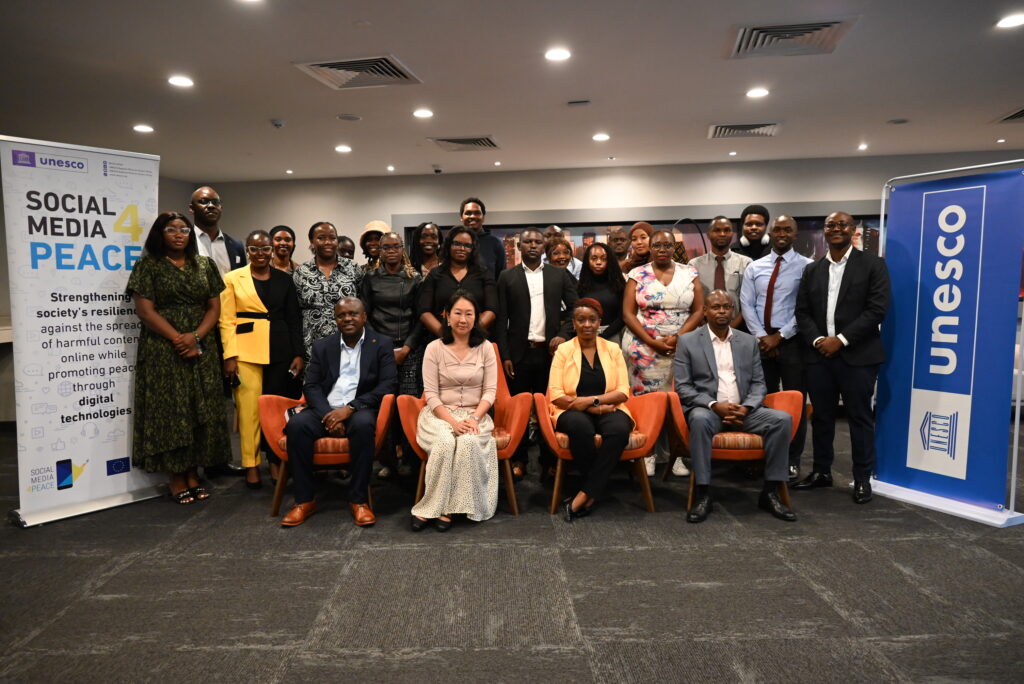
This new phase builds on the achievements of Phase I and will continue to support national stakeholders to develop and apply evidence-based and context-relevant mechanisms to curb the spread and impact of online harmful content, including disinformation and hate speech. It aims to strengthen capacities and enhance cooperation with state authorities, members of parliament and judiciary to safeguard freedom of expression and promote access to information; and will also promote active participation of the marginalized and vulnerable groups in the governance of the information ecosystem in Kenya.
The event attracted participation of 24 participants representing the 17 FECoMo member organizations, who collectively presented and discussed ideas and plans to continue building on the results achieved in the last three years, and the priorities that will guide their work during the phase II of the project which will run until December 2027. This also marked an opportunity for co-creation of priority areas for the phase 2 of SM4P project.
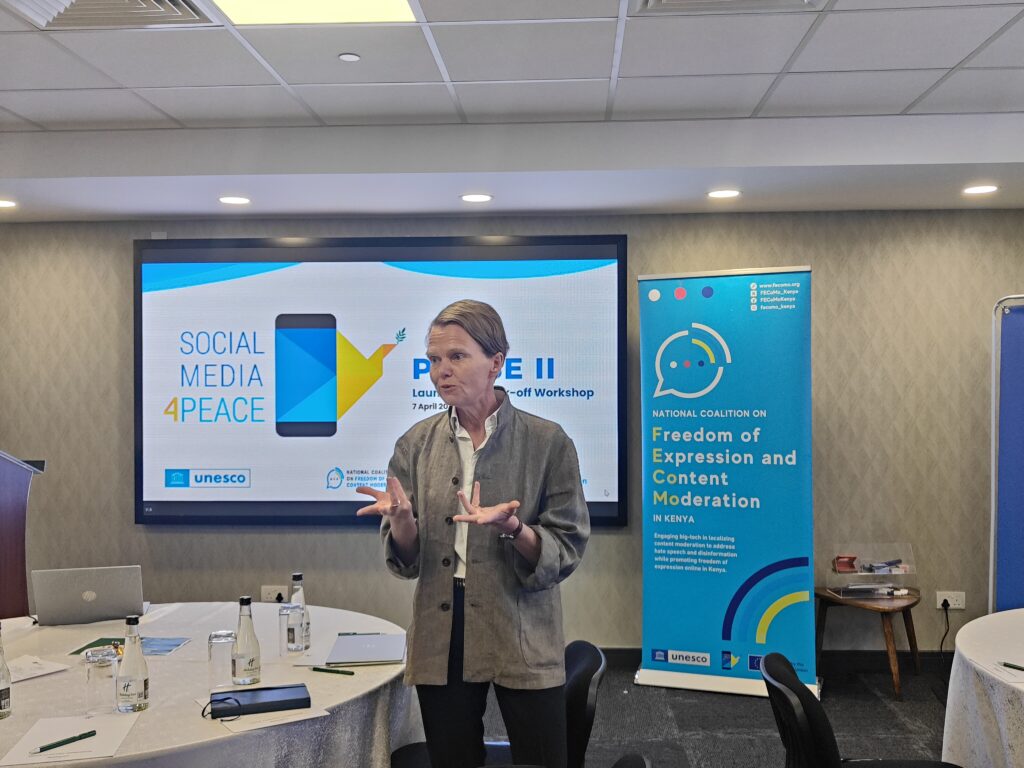
In her remarks, UNESCO Regional Director for Eastern Africa, Louise Haxthausen, commended Kenya’s commitment to the project, stating that:
“Kenya’s commitment to the Social Media for Peace initiative has been exceptional, and the establishment of a dynamic, engaged coalition (FECoMo) is one of our key successes. This coalition is not just symbolic; it is actively driving change. Our goal is to continue fostering a digital landscape that prioritizes human rights, peaceful discourse, and collective resilience,”
Ms Haxthausen emphasized the importance of expanding the membership of the coalition and increase its diversity by including more members from vulnerable communities, women and youth, who are among the most affected groups by the increasing hateful content and online disinformation.
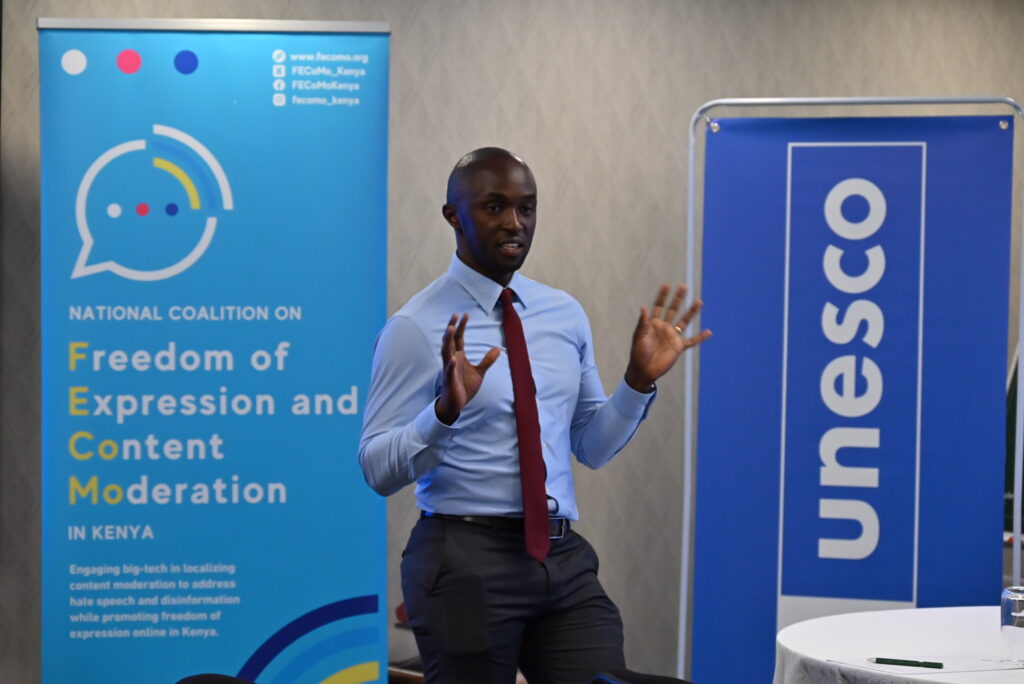
John Okande, Programme Officer at UNESCO indicated that key actions of the Phase II of SM4P will include:
- Fostering stronger partnerships with national actors, including content creators and digital platforms
- Creating tools and knowledge products to improve human rights-based content moderation practices; and
- Increasing youth engagement in addressing harmful content on digital platforms and promoting peacebuilding narratives.
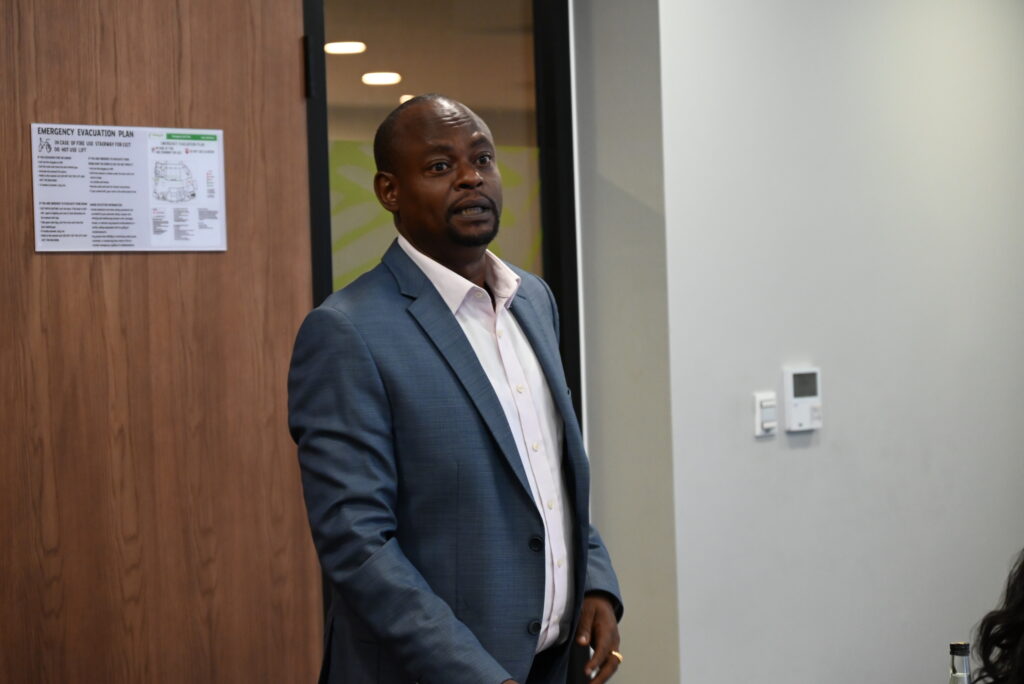
A major development announced during the meeting was the Draft National Guidelines for Disinformation and Hate Speech in Kenya, with support from the SM4P project. Kyalo Mwengi, Deputy Director Legal Services at the National Cohesion and Integration Commission (NCIC) underscored the importance of this initiative, especially ahead of the 2027 elections.
“Hate speech, misinformation, and disinformation have increasingly moved to social media, where news spreads rapidly. We are majorly concerned about data security, especially with AI tools and other emerging technologies. As we approach the election period, it is crucial to build the capacity of youth to identify and use accurate information,” Mwengi emphasized.
The developed guidelines emphasize compliance with existing laws, user responsibility in flagging false content, and strong data protection. They advocate for evidence-based research, platform accountability, and timely removal of harmful content, grounded in human rights, transparency, and safety.
Misako Ito, Regional Advisor for Communication and Information in Africa at UNESCO, reaffirmed the importance of anchoring digital governance frameworks in international human rights standards stating:
“To address online harms, we must ensure that we align existing legal tools with international human rights frameworks. For instance, UNESCO’s guidelines on governance of digital platforms offer valuable guidance that would help us create accountable and inclusive digital spaces. By implementing these frameworks, we can protect users’ rights and address emerging online threats in Kenya’s growing digital landscape.”
Sharon Kechula, Programme Manager at the Association of Media Women in Kenya (AMWIK) highlighted the need for stronger protections against Technology-Facilitated Gender-Based Violence (TFGBV), particularly for women and marginalized groups.
“We must intensify our efforts to ensure that women and marginalized communities are protected from digital harm, stressing the urgency of creating stronger legal frameworks as Kenya approaches the 2027 elections.
The event also explored opportunities for mechanisms for creating synergies between UNESCO’s SM4P Phase II project and the KENSAFE initiatives, both funded by the European Union. These collaborative efforts aim to maximize impact in curbing harmful online content through shared resources and expertise.
Miriam Beatrice Wanjiru, Programme Officer for Eastern Africa at the Paradigm Initiative, emphasized the need to expand the project’s outreach beyond Nairobi to ensure inclusive participation from local organizations and counties within Kenya.
“As we move into the next phase, it is crucial to take the conversation beyond Nairobi and engage local organizations. Decentralizing our efforts will ensure more inclusive participation in the project”
She added that the coalition should strengthen its role in legal and litigation processes to create lasting change.
The first phase of SM4P, launched in 2021, laid the foundation for addressing the challenges posed by social media, such as disinformation, hate speech, and other harmful content. It strengthened journalists’ capacities, equipped youth with media and information literacy (MIL) skills, and promoted dialogue between digital platforms and local stakeholders.
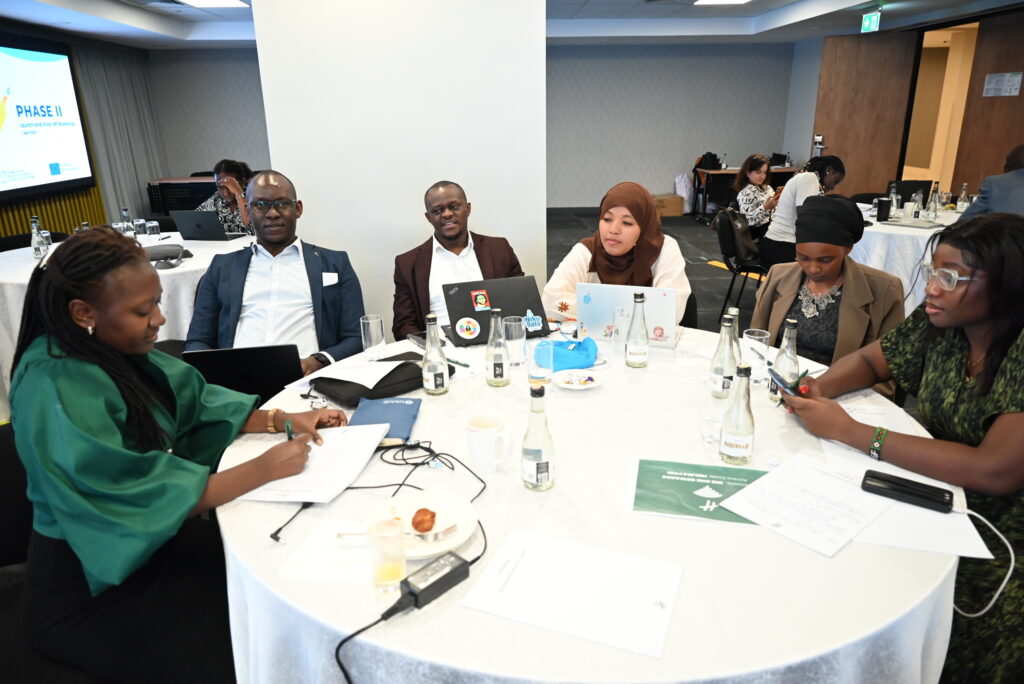
The launch also featured interactive working group session, where participants from various FECoMo member organizations shared their priority intervention areas. The session aimed to identify opportunities for synergy and collaboration, with discussions centered on how partners can align their strategies and pool resources such as human capital, technical expertise, and financial support to amplify the impact of their initiatives. This collaborative approach is expected to enhance the coalition’s effectiveness and foster more coordinated responses to common challenges.
Social Media 4 Peace is a UNESCO initiative, funded by the EU Service for Foreign Policy Instruments.
 Afrikaans
Afrikaans Shqip
Shqip አማርኛ
አማርኛ العربية
العربية Հայերեն
Հայերեն Azərbaycan dili
Azərbaycan dili Euskara
Euskara Беларуская мова
Беларуская мова বাংলা
বাংলা Bosanski
Bosanski Български
Български Català
Català Cebuano
Cebuano Chichewa
Chichewa 简体中文
简体中文 繁體中文
繁體中文 Corsu
Corsu Hrvatski
Hrvatski Čeština
Čeština Dansk
Dansk Nederlands
Nederlands English
English Esperanto
Esperanto Eesti
Eesti Filipino
Filipino Suomi
Suomi Français
Français Frysk
Frysk Galego
Galego ქართული
ქართული Deutsch
Deutsch Ελληνικά
Ελληνικά ગુજરાતી
ગુજરાતી Kreyol ayisyen
Kreyol ayisyen Harshen Hausa
Harshen Hausa Ōlelo Hawaiʻi
Ōlelo Hawaiʻi עִבְרִית
עִבְרִית हिन्दी
हिन्दी Hmong
Hmong Magyar
Magyar Íslenska
Íslenska Igbo
Igbo Bahasa Indonesia
Bahasa Indonesia Gaeilge
Gaeilge Italiano
Italiano 日本語
日本語 Basa Jawa
Basa Jawa ಕನ್ನಡ
ಕನ್ನಡ Қазақ тілі
Қазақ тілі ភាសាខ្មែរ
ភាសាខ្មែរ 한국어
한국어 كوردی
كوردی Кыргызча
Кыргызча ພາສາລາວ
ພາສາລາວ Latin
Latin Latviešu valoda
Latviešu valoda Lietuvių kalba
Lietuvių kalba Lëtzebuergesch
Lëtzebuergesch Македонски јазик
Македонски јазик Malagasy
Malagasy Bahasa Melayu
Bahasa Melayu മലയാളം
മലയാളം Maltese
Maltese Te Reo Māori
Te Reo Māori मराठी
मराठी Монгол
Монгол ဗမာစာ
ဗမာစာ नेपाली
नेपाली Norsk bokmål
Norsk bokmål پښتو
پښتو فارسی
فارسی Polski
Polski Português
Português ਪੰਜਾਬੀ
ਪੰਜਾਬੀ Română
Română Русский
Русский Samoan
Samoan Gàidhlig
Gàidhlig Српски језик
Српски језик Sesotho
Sesotho Shona
Shona سنڌي
سنڌي සිංහල
සිංහල Slovenčina
Slovenčina Slovenščina
Slovenščina Afsoomaali
Afsoomaali Español
Español Basa Sunda
Basa Sunda Kiswahili
Kiswahili Svenska
Svenska Тоҷикӣ
Тоҷикӣ தமிழ்
தமிழ் తెలుగు
తెలుగు ไทย
ไทย Türkçe
Türkçe Українська
Українська اردو
اردو O‘zbekcha
O‘zbekcha Tiếng Việt
Tiếng Việt Cymraeg
Cymraeg isiXhosa
isiXhosa יידיש
יידיש Yorùbá
Yorùbá Zulu
Zulu